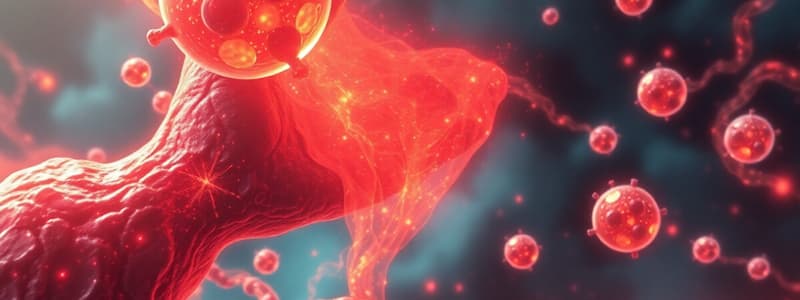Podcast
Questions and Answers
What are some common symptoms of Stevens-Johnson syndrome (SJS)?
What are some common symptoms of Stevens-Johnson syndrome (SJS)?
- Nausea and vomiting
- Severe headache and dizziness
- Chest pain and shortness of breath
- Fever and flu-like symptoms (correct)
Which medication is commonly associated with triggering Stevens-Johnson syndrome?
Which medication is commonly associated with triggering Stevens-Johnson syndrome?
- Lisinopril
- Carbamazepine (correct)
- Metformin
- Levothyroxine
What is the primary focus of treatment for Stevens-Johnson syndrome?
What is the primary focus of treatment for Stevens-Johnson syndrome?
- Reinforcing the immune system
- Providing long-term medication
- Managing symptoms and preventing complications (correct)
- Curing the underlying infection
Which of the following is NOT a trigger for Stevens-Johnson syndrome?
Which of the following is NOT a trigger for Stevens-Johnson syndrome?
Which of the following anticonvulsants is associated with an increased risk of developing Stevens-Johnson syndrome?
Which of the following anticonvulsants is associated with an increased risk of developing Stevens-Johnson syndrome?
What is a characteristic of a side effect from medication?
What is a characteristic of a side effect from medication?
Which of the following describes an adverse effect of drugs?
Which of the following describes an adverse effect of drugs?
What does a black box warning indicate?
What does a black box warning indicate?
Which drug is known to cause nephrotoxicity?
Which drug is known to cause nephrotoxicity?
What is a common symptom of anaphylaxis?
What is a common symptom of anaphylaxis?
Which condition is known for potentially causing painful shedding of skin and mucous membranes?
Which condition is known for potentially causing painful shedding of skin and mucous membranes?
Which drug interaction involves the consumption of green leafy vegetables?
Which drug interaction involves the consumption of green leafy vegetables?
What type of toxicity is characterized by the damage to the heart, potentially leading to prolonged QT intervals?
What type of toxicity is characterized by the damage to the heart, potentially leading to prolonged QT intervals?
What is a recommended strategy for preventing medication errors?
What is a recommended strategy for preventing medication errors?
Which physiological change in the elderly increases the risk of renal injury related to medication use?
Which physiological change in the elderly increases the risk of renal injury related to medication use?
What constitutes polypharmacy?
What constitutes polypharmacy?
Which medication class is associated with sedation and confusion in elderly patients?
Which medication class is associated with sedation and confusion in elderly patients?
What is one of the proposed strategies to enhance medication adherence in elderly clients?
What is one of the proposed strategies to enhance medication adherence in elderly clients?
Which synergistic effect occurs when two drugs combined have a total effect equal to the sum of their individual effects?
Which synergistic effect occurs when two drugs combined have a total effect equal to the sum of their individual effects?
How does the liver function change with age, affecting medication metabolism?
How does the liver function change with age, affecting medication metabolism?
Which herbal supplement is indicated for post-menopausal symptoms but has potential hepatotoxic effects?
Which herbal supplement is indicated for post-menopausal symptoms but has potential hepatotoxic effects?
What adverse effect is commonly associated with the use of Nonsteroidal Anti-Inflammatory Drugs (NSAIDs) in elderly patients?
What adverse effect is commonly associated with the use of Nonsteroidal Anti-Inflammatory Drugs (NSAIDs) in elderly patients?
Which of the following medications is contraindicated in patients with existing renal disorders?
Which of the following medications is contraindicated in patients with existing renal disorders?
What effect do opioids have on elderly patients that increases their risk of serious side effects?
What effect do opioids have on elderly patients that increases their risk of serious side effects?
Which dietary supplement is exempt from FDA regulation under the DSHEA?
Which dietary supplement is exempt from FDA regulation under the DSHEA?
What is a common complication of polypharmacy in elderly patients?
What is a common complication of polypharmacy in elderly patients?
Flashcards
Side effect
Side effect
A predictable and expected effect of a medication that occurs at therapeutic dose.
Adverse effect
Adverse effect
A harmful or undesirable effect of a medication that may occur at or above therapeutic dose.
Black Box Warning
Black Box Warning
A label warning from the FDA about the potential for serious adverse effects of a medication.
Allergic reaction
Allergic reaction
Signup and view all the flashcards
Teratogenicity
Teratogenicity
Signup and view all the flashcards
Nephrotoxicity
Nephrotoxicity
Signup and view all the flashcards
Hepatotoxicity
Hepatotoxicity
Signup and view all the flashcards
Cardiotoxicity
Cardiotoxicity
Signup and view all the flashcards
Stevens-Johnson Syndrome (SJS)
Stevens-Johnson Syndrome (SJS)
Signup and view all the flashcards
Antibiotics
Antibiotics
Signup and view all the flashcards
Anticonvulsants
Anticonvulsants
Signup and view all the flashcards
Non-steroidal anti-inflammatory drugs (NSAIDs)
Non-steroidal anti-inflammatory drugs (NSAIDs)
Signup and view all the flashcards
Allopurinol
Allopurinol
Signup and view all the flashcards
Weaker Hearts in the Elderly
Weaker Hearts in the Elderly
Signup and view all the flashcards
Blood Pressure Changes in the Elderly
Blood Pressure Changes in the Elderly
Signup and view all the flashcards
Reduced Kidney Function in the Elderly
Reduced Kidney Function in the Elderly
Signup and view all the flashcards
Reduced Liver Function in the Elderly
Reduced Liver Function in the Elderly
Signup and view all the flashcards
Decreased Muscle Mass in the Elderly
Decreased Muscle Mass in the Elderly
Signup and view all the flashcards
Thinner Skin in the Elderly
Thinner Skin in the Elderly
Signup and view all the flashcards
Polypharmacy
Polypharmacy
Signup and view all the flashcards
Beers Criteria
Beers Criteria
Signup and view all the flashcards
Synergism
Synergism
Signup and view all the flashcards
Agonism
Agonism
Signup and view all the flashcards
Antagonism
Antagonism
Signup and view all the flashcards
GABA (gamma-amino butyric acid)
GABA (gamma-amino butyric acid)
Signup and view all the flashcards
Dietary Supplement Health and Education Act (DSHEA)
Dietary Supplement Health and Education Act (DSHEA)
Signup and view all the flashcards
Herbal Medications
Herbal Medications
Signup and view all the flashcards
Alternative Medicine
Alternative Medicine
Signup and view all the flashcards
Study Notes
Drug Effects
- Side Effect: A predictable and expected effect occurring at a therapeutic dose
- Adverse Effect: A harmful and undesirable effect that can occur at or above a therapeutic dose.
- Black Box Warning: FDA warning label indicating potential severe adverse effects.
- Allergic Reaction: An immune-mediated response, often rapid, after medication administration.
- Mild: Pruritis (itching), rash
- Anaphylaxis: Severe reaction involving multiple body systems, treated with epinephrine.
- Respiratory: Chest tightness, airway swelling, hoarseness, wheezing, trouble breathing
- Cardiovascular: Chest pain, hypotension (low blood pressure), rapid heart rate
- Skin: Hives (urticaria), flushing, itching (pruritis), swelling of face/throat/tongue (angioedema)
- CNS: Anxiety, headache, confusion, drowsiness
- GI: Nausea/vomiting, diarrhea, cramping
Toxicities
- Teratogenicity: Causing harm to a developing fetus, leading to birth defects
- Nephrotoxicity: Kidney damage.
- Monitor blood urea nitrogen (BUN) and creatinine levels.
- Drug causes: Diuretics, ACE inhibitors/Angiotensin receptor blockers, aminoglycosides, metformin, NSAIDs
- Hepatotoxicity: Liver damage.
- Monitor liver function tests (LFTs).
- Signs/Symptoms: Jaundice
- Neurotoxicity: Brain or nerve damage.
- Signs/Symptoms: Headaches, neuropathy, confusion
- Dermatologic toxicity: Skin damage.
- Rash, itching (pruritis), swelling (angioedema), photosensitivity, Stevens-Johnson Syndrome (SJS)
- Drug causes: Antiepileptic drugs, sulfa drugs
- Ototoxicity: Ear damage.
- Tinnitus, hearing loss
- Drug causes: Aminoglycosides (e.g., gentamicin)
- Musculoskeletal toxicity: Muscle or tendon damage.
- Statin drugs can cause rhabdomyolysis.
- Fluoroquinolone antibiotics (e.g., levofloxacin, ciprofloxacin) can cause tendonitis/rupture
- Bone marrow suppression: Damage to bone marrow, affecting red blood cells (RBCs), white blood cells (WBCs), and platelets.
- Low RBCs → anemia, fatigue, paleness, weakness, falls
- Low WBCs → fever, infection, cough
- Low platelets → bleeding, bruising, petechiae
- Drug causes: Antineoplastic agents
- Cardiotoxicity: Heart damage.
- Prolonged QT interval can lead to Torsades de Pointes (potentially fatal abnormal heart rhythm).
- Drug causes: Doxorubicin
Drug Interaction
- A change in how a drug acts when combined with another drug, food, or substance.
- Warfarin: Interfered with by green leafy vegetables (high vitamin K)
- Statins: Interfered with by grapefruit juice
- Acetaminophen (Tylenol): Interfered with by alcohol
- MAOI antidepressants: Interfered with by cheese, cured meats, ripe fruit
Stevens-Johnson Syndrome (SJS)
- A severe, potentially life-threatening skin condition.
- Characterized by painful skin shedding and mucous membrane involvement.
- Often triggered by medications, infections, or other factors.
- Symptoms include fever, flu-like symptoms, blisters, and sores.
- Requires immediate medical attention.
- Triggering Medications (examples): Antibiotics, Anticonvulsants, NSAIDs, Allopurinol, HIV drugs, psychiatric medications, some chemotherapy agents
Medication Error Reduction Strategies
- Stay updated on knowledge
- Stick to known procedures
- Scan & confirm (e.g., with barcode technology)
- Consult with interdisciplinary teams
- Write everything down
- Store look-alikes and sound-alikes separately
- Double-check "high-alert" medications
- Double-check neonatal prescriptions
Geriatric Care
- Physiological Changes:
- Reduced cardiac output
- Weakened vascular control (orthostatic hypotension, bradycardia, tachycardia)
- Reduced kidney function / drug elimination
- Reduced liver function / drug metabolism
- Decreased muscle mass/distribution
- Thinner skin
- Polypharmacy: ≥5 medications. Increased risk of drug interactions and adverse effects. Complicated regimens may reduce adherence
- Beers Criteria: List of medications to use cautiously in elderly clients due to higher adverse effects. (Certain antibiotics, antipsychotics, benzodiazepines, digoxin, muscle relaxants, NSAIDs, opioid analgesics, blood thinners)
Strategies for Improving Medication Adherence
- Non-safety caps for pill bottles
- Use large font on bottles/instructions
- Provide detailed instructions to patients/caregivers
- Pill reminders
- Simplify the drug regimen
Complementary and Alternative Medicines
- DSHEA (Dietary Supplement Health and Education Act): Exempts supplements from FDA standards, treating them like food.
- Herbal Medications: Nutritional supplements sold without prescription, lacking FDA approval.
- Alternative Medicine: Therapies outside conventional medicine (e.g., naturopathic medicine, yoga, hypnosis, acupuncture).
- Synergism: Combined effect = sum of individual effects
- Agonism: Combined effect > sum of individual effects
- Antagonism: Combined effect < sum of individual effects
- GABA: Neurotransmitter inhibiting nerve transmission in the CNS
Herbal Supplements
- (Extensive list of herbal supplements) with their uses, mechanisms, effects, and contraindications. (Note: This is a summarization, full information about each is provided).
Studying That Suits You
Use AI to generate personalized quizzes and flashcards to suit your learning preferences.




